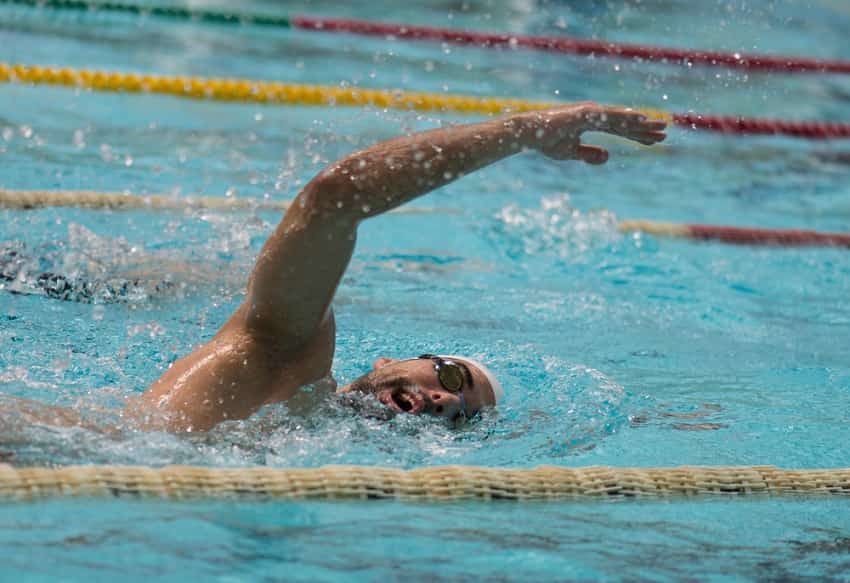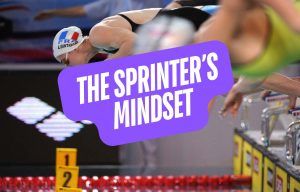Sound familiar?
I bet it does.
I’ve experienced it, continue to experience it, and judging by the number of emails I get from swimmers frustrated with this exact thing a whole chlorinated bunch of you do as well.
The dreaded plateau.
We all experience it. For those of us who have been around the block a few times we might even know that it’s coming, but this doesn’t make it any easier when it does happen.
- Am I doing this all wrong?
- Have I maxed out my abilities and talent in the water?
- Will I never get any faster than I am right now?
- What if I keep working hard in the water and nothing ever gets better?
There are about a thousand different reasons that things have flat-lined for you in the pool.
But there are a handful that I see pop up over and over again both with other swimmers and in my own travels around the black line.
Here are some of the more common reasons your hard work doesn’t appear to be paying off:
The illusion of the clock.
The way we judge our swimming, both in practice and in competition, is usually based completely by the scoreboard and pace clock.
Best time? Great success.
Slower than our PB? Booooo.
Using the clock as the only marker for whether a swim was good or not is a problem because the clock isn’t the only marker of improvement in the water.
Not even close.
The time on the clock doesn’t lie, but it doesn’t tell the whole truth. If we base how feel about our swimming completely and totally on what we see on the clock we are ignoring the million other things that are happening in the water.
Improvement in the water isn’t always on the clock.
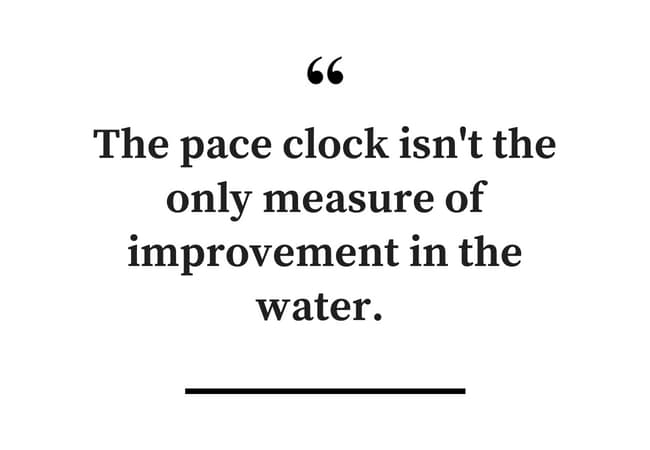
When you think about it, becoming a faster swimmer is a transformation—your body is literally adapting and learning to move through the water with less effort.
Not all of the changes you want to happen are going to happen at exactly the same time, and they don’t happen at the same rate.
Read that again, because it’s important to understand. Change and improvement doesn’t happen uniformly.
That being said, even though the clock might not be telling us what we wanna hear that day in the water, what are you doing to improve today?
Are your turns improving? Is your breakout getting better? Are you getting better at holding the breathing patterns? Are you being mindful of your stroke rate on every lap? Are you crushing the high elbow pull? Not rolling your head too much to breathe?
See where I am going with this?
The clock is just one measure of getting better in the water.
Being “faster” means doing countless things better. Just because your overall rate of improvement isn’t there today doesn’t mean you can’t hammer away at those other little aspects of your training.
The most powerful side-effect of this mindset change is realizing that there are always things you can control and focus on during the workouts where you feel like your hands are slopping through Jello.
We can’t always control how we feel in the water, or what the results are, but we can choose to work on something today that has nothing to do with either of those things.
And of course, the fact that there are so many things you can be working on means that there are countless ways for you to take control of your swimming (and consequently, feel motivated again).
The faster you get, the slower you improve.
This is one of the less-talked about aspects of high-performance swimming—when we first commit to getting better we improve quickly. Everything is gravy during this phase.
But as we master it (whether it’s a skill, a conditioning level, a higher elbow catch) and those first few waves of adaptation pass us by, improvement starts to slow down. It might even completely stall out.
Even though we are still working super hard and doing everything right.
It’s just the nature of improvement.
The top swimmers in the world know this better than most. Think about all of the training and practices they do just in the hopes of matching or slightly besting their personal best times.
When we first start something the rate of improvement is hilarious—just don’t expect it to last forever.
Which transitions well into…
You are working hard at doing the things you are comfortable doing.
Progress comes from doing new things.
By “new” I don’t mean suddenly switching coach and club mid-week—but by doing a new interval, a smaller stroke count, more dolphin kicks off the wall.
“Working hard” is a really subjective thing to say and just about every swimmer in the water can find a way to justify saying it.
For example, I can say that I went and swam 2,000m really hard, but that certainly doesn’t mean I swam well or even in a way that is going help me become a better swimmer.
If you are working hard at doing the same things you’ve always done you are just gonna get really good at swimming the same speeds you always have.
Effort isn’t enough.
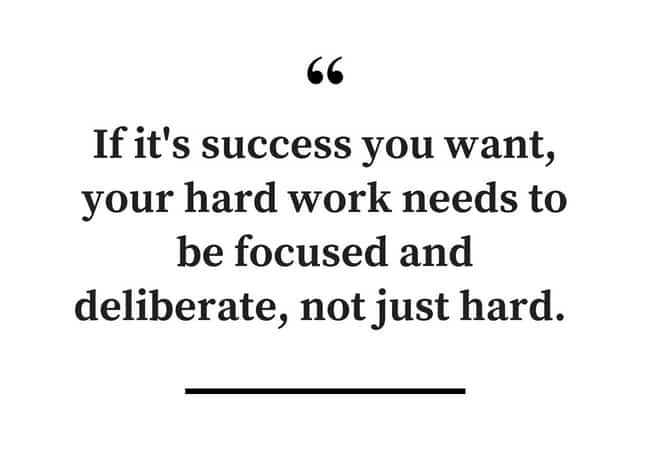
Your effort needs to be focused at swimming better in all respects, and not just “hard.”
Those times where you experience violent bursts of improvement come from when you are swimming harder and better.
Accumulated fatigue.
One of the biggest crises in confidence I experienced in my competitive days was around a month out from big meets.
This was usually when training was at its hardest.
The volume was high, the intensity was cranked, and I would find myself frustrated with a lack of speed in the water.
Because I was showing up and working hard every day at practice I was carrying around some serious work fatigue that had built up over the weeks and months of training.
Contrast this with other swimmers in the group who had missed a fair chunk of training. To my chagrin and frustration, they’d crush me in practice because they were essentially tapered.
It felt hilariously unfair to be getting dusted by swimmers who were barely showing up to practices.
The harder you train, the more fatigue you are going to carry around with you.
The effects of yesterday’s hard workout don’t just disappear after a night of sleep. Now imagine the stockpile of fatigue that comes from weeks and months of hard training.
This is the burden of being the swimmer who shows up and kicks butt every day.
The good news?
Have faith in the program and when you get your chance to fully rest up and recover you’ll discover a new gear in the pool you never thought possible.
You aren’t giving yourself a chance to recover.
Speaking of fatigue, how hard do you work at the recovery aspect of your training? How serious are you about getting to bed early each night? How well are you eating before, during and after your swim practices?
Along the same vein as accumulated fatigue, if you aren’t giving yourself a chance to recover properly between thrashings in the water you aren’t giving yourself space to adapt to the training.
Think of your body as a big old battery. If you don’t let it charge overnight, how much battery are you left with in the morning? If you aren’t giving it sporadic charges over the course of the day how much charge does it have left by the end of the day?
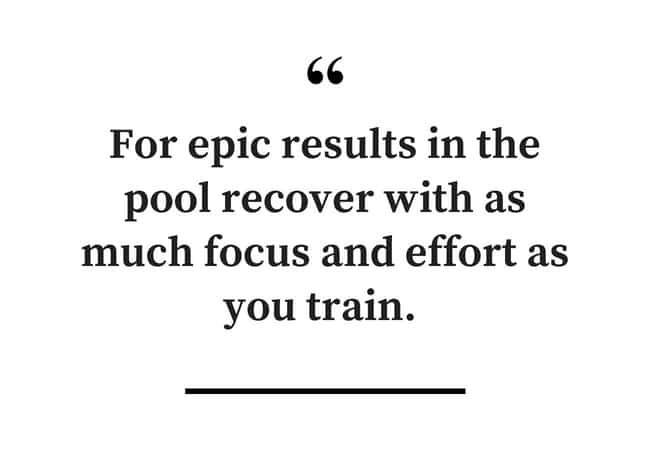
With 25% juice left you are scrambling for ways to get a quick charge over the course of the day (coffee, pre-workouts, etc).
Working hard is awesome, but you should be recovering just as hard.
Think of all those recovery activities as ways to recharge your personal battery.
Stretching and foam rolling after practice. Staying hydrated over the course of the day. Doing some form of mindfulness work to help keep stress at bay. Getting all the sleep you can get your hands on.
Recover as hard as you are working in the pool.
The hardest part of all… Keep showing up.
I’ll never forget the first time I swam a :27 long course for a 50 free in practice.
I’ll never forget it because I didn’t expect it.
It came on a Saturday afternoon after a bruising week of training. It was my tenth session of the week, and it was around the 51,550’th meter that I’d swum during that span. At the tail end of a race pace set I dropped a :27 high.
Immediately buoyed by this and wanting to make sure this wasn’t a one-off or a fluke, I was able to repeat this result on the next rep.
Ka-boom. Massive breakthrough.
I certainly hadn’t planned on it that morning. But I’d shown up, done everything right in training, and gave myself the best possible chance that day for improvement to burst through.
That’s what you can do each day. Show up, give your best, and good things will happen.
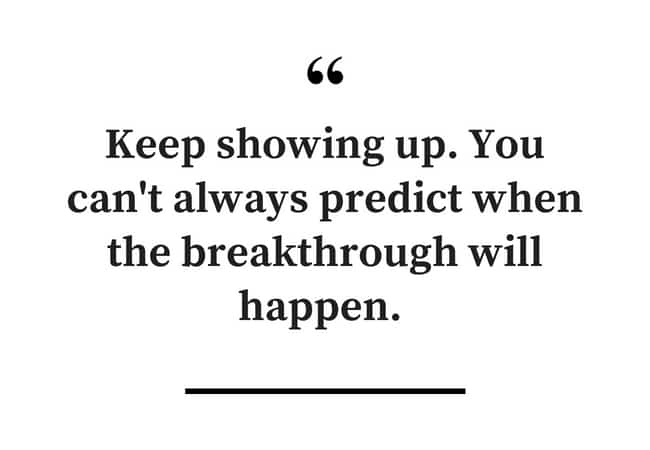
Those breakthroughs won’t happen every day, and you can rarely predict the exact moment they will happen, but you exponentially increase the likelihood of those huge new jolts of improvement by showing up.
That breakthrough you want might not happen today.
Maybe not tomorrow.
But it’s coming in hot as long as you keep showing up.
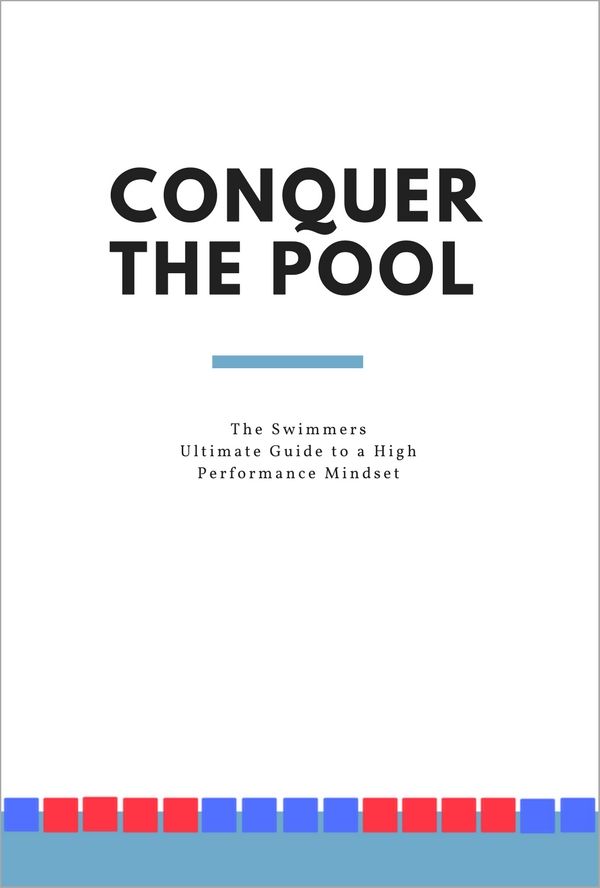 Mental training for swimmers finally made simple.
Mental training for swimmers finally made simple.
Tired of choking on race day? Want to finally conquer your mindset so that you can give your PB’s the beating they deserve?
Conquer the Pool: The Swimmer’s Ultimate Guide to a High Performance Mindset might just be for you. Used and trusted by some of the top clubs and swimmers on the planet.

